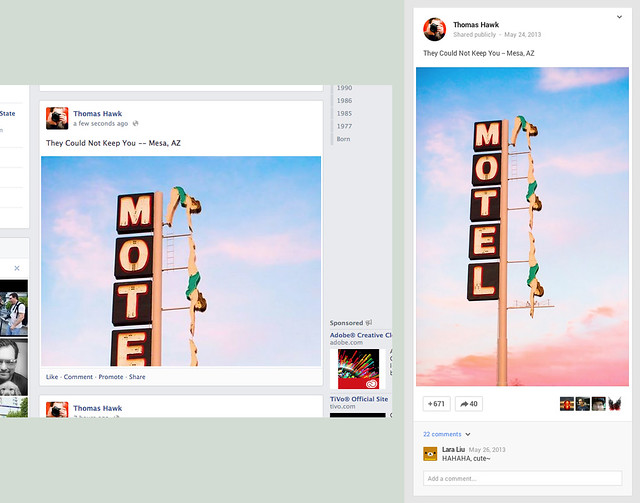 The past week has been an interesting roller coaster ride with photographers and other creatives sounding the alarm about Facebook’s pending Data Policy and Statement of Rights and Responsibilities changes. On one hand good for photographers for taking note and on the other hand too bad photographers don’t realize their pact with the “devil” is already signed regardless of this particular revision to Facebook’s governing documents. Let me be blunt. If you’ve been using Facebook to this point everything you fear has already been realized… too little, too late.
The past week has been an interesting roller coaster ride with photographers and other creatives sounding the alarm about Facebook’s pending Data Policy and Statement of Rights and Responsibilities changes. On one hand good for photographers for taking note and on the other hand too bad photographers don’t realize their pact with the “devil” is already signed regardless of this particular revision to Facebook’s governing documents. Let me be blunt. If you’ve been using Facebook to this point everything you fear has already been realized… too little, too late.
First, let’s cover one thing, you should care about my opinion because I’m intimately familiar with Facebook advertising. Second, I’ve been writing for a long time about the pitfalls of social media on my blog and in magazines, terms of use changes and social media best practices. Third, I’m a photographer and I care a great deal about protecting my photographic work and passing on that information to fellow photographers of an equal mindset. The one caveat you need to take into account before reading on is that I am not a lawyer and what I’m sharing with you is just one man’s opinion, so take it for what you will.
If you’d like to follow along I’ll be referencing the following documents quite heavily, the redlined revisions that Facebook is now reviewing feedback on.
• Statement of Rights and Responsibilities (SRR)
• Data Use Policy
Why you’re already “screwed” if you’re using Facebook (& even if you don’t)
Point #1
You’ve already signed away the rights to have your posted images on Facebook used even if you decide to jump on a high horse and leave Facebook. Yes, you’ve already committed the content you’ve posted on Facebook to the terms you hate because you sought the attention of your peers in the hope they’d share it. The following is a portion of the SRR that are unchanged and have been in place for a long time:
2. Sharing Your Content and Information
You own all of the content and information you post on Facebook, and you can control how it is shared through your privacy and application settings. In addition:
1. For content that is covered by intellectual property rights, like photos and videos (IP content), you specifically give us the following permission, subject to your privacy and application settings: you grant us a non-exclusive, transferable, sub-licensable, royalty-free, worldwide license to use any IP content that you post on or in connection with Facebook (IP License). This IP License ends when you delete your IP content or your account unless your content has been shared with others, and they have not deleted it.
So if you leave and delete your account, any image that has been uploaded and shared will stay on Facebook until every single person that shared it deletes their share. And… will be subject to how Facebook decides to use the content.
Point #2
You already volunteer data to Facebook about your activities and interests through Facebook social plugins, namely the “Like” button found on most 3rd party web sites. (See What are Social Buttons) Even more interesting is that you’re sending data about your activity to Facebook even if you don’t have a Facebook account or are logged out of Facebook. Don’t believe me? “Read Facebook’s FAQ entry What information does Facebook get when I visit a site with the Like button or another social plugin? For many unfamiliar I’m sure this will be an eye opener.
“If you’re logged out or don’t have a Facebook account and visit a website with the Like button or another social plugin, your browser sends us a more limited set of information.”
To top that off as of a year ago it was estimated nearly 1/2 of all web pages (49.3%) were Facebook integrated as compared to Twitter (41.7%), Google+ (21.5%) and LinkedIn (3.9%) (worst case numbers via Pingdom)
The Sky is Falling, Again… Thanks to A Court Settlement
Photographers everywhere including professional, semi-pro and amateur have recently been airing concerns and alerting peers because of this highly offending update:
You can use your privacy settings to limit how your name, and profile picture may be associated with commercial, sponsored, or related content (such as a brand you like) served or enhanced by us. You give us permission to use your name, and profile picture, content, and information in connection with commercial, sponsored, or related that content (such as a brand you like) served or enhanced by us, subject to the limits you place. This means, for example, that you permit a business or other entity to pay us to display your name and/or profile picture with your content or information, without any compensation to you. If you have selected a specific audience for your content or information, we will respect your choice when we use it.
This does at first glance sound bad, but it represents activity that Facebook was already performing with Facebook Sponsored Ads and Sponsored Stories. Due to a class action lawsuit, Angel Fraley vs. Facebook Inc. CV 11-01726 RS (PDF) in Northern California District Court concerning privacy and permission issues in Sponsored Ads & Stories, a settlement was reached requiring Facebook to include this very text word for word. See page 6 section 2.1(a) under Settlement Terms.
If you keep reading though in section 2.1(b) Facebook is also required to provide their users the ability to manage which of their content can be used in Sponsored Stories.
User Visibility and Control Over Sponsored Stories. Facebook will create an easily accessible mechanism that enables users to view, on a going-forward basis, the subset of their interactions and other content on Facebook that have been displayed in Sponsored Stories (if any). Facebook will further engineer settings to enable users, upon viewing the interactions and other content that are being displayed in Sponsored Stories, to control which of these interactions and other content are eligible to appear in additional Sponsored Stories. Without limiting the foregoing, but for the sake of clarity, these settings will include the ability to enable users to prevent individual interactions and other content (or categories of interactions and other content) from appearing in additional Sponsored Stories.
Good and Bad
As a long standing ASMP member I highly respect their opinions on the matter (see Beware Facebook’s New Terms of Service), but the alarm is really too late. They should have read the tea leaves (that were pretty well spelled out) in the class action lawsuit settlement noted above. The email alert I received from ASMP highlights how even the savviest of photographers and associations missed the boat long ago.
The new Facebook Terms of Use have been modified to allow the company to sell virtually anything that is uploaded to the service, including all your photos, your identity and your data. Facebook has also explicitly removed the privacy protection from the commercialization rights.
This means that any photos uploaded to Facebook may be sold, distributed or otherwise commercialized with no compensation to the photographer.
Facebook has and will continue to commercialize content uploaded to the service. The latest changes to the SRR reflect past Facebook activity and just spell it out in greater detail. Facebook is free in a monetary sense as you don’t pay a subscription, but you do pay daily with the currency of your privacy and content.
On the other hand Facebook does provide a valuable and good service to its members allowing an incredibly streamlined platform to interact with friends, fans and customers. While many Facebook users likely are unaware of the tradeoffs they’ve made, they benefit from the service overall. Still for many how the sausage is made isn’t pretty and it is scary. Case in point Facebook’s own definitions of how everyday Facebook activity is used to make the service work overall (via Facebook Data Use Policy):
We receive data about you whenever you use or are running interact with Facebook, such as when you look at another person’s timeline, send or receive a message, search for a friend or a Page, click on, view or otherwise interact with things, use a Facebook mobile app, or purchase Facebook Credits, or make other purchases through Facebook
And if that interests you there are 4 more paragraphs following that one in the Data Use Policy detailing other types of behavior and data that are tracked. On the upside most user data is kept anonymous so even if reading this scares you know all is not lost… if you trust Facebook.
Is Facebook Really the Photographer’s Boogieman?
ASMP has one important point that has to be repeated, “One of the things ASMP and its allies are most concerned about is that these usage terms and attitudes towards users’ content are becoming the norm.” On this front I agree. Of all of Facebook’s transgressions it is this repeated effort to erode individuals expectation of online privacy. Without fail Facebook regularly makes changes that reach very far and then they pull back a little. This amounts to taking 5 steps forward and then 2 steps back, netting 3 steps forward. Privacy and content that qualifies as a photographer’s intellectual property (IP) is certainly a different subject right?
Photographers have a knack for sounding the alarm when it comes to the unauthorized use of their intellectual property and rightly so. Adding to the concern is when usage terms are vague and the manner in which IP is used is completely new. In this regard photographers need to weigh the pros and cons of the service and its terms. Since writing about Facebook I’ve yet to see Facebook steal or misuse images in a traditional sense and I doubt they will. As most stock photographers know the value of stock continues to plummet so Facebook is likely to continue making billions with advertising versus creating a new stock agency with pilfered images. Facebook is and will always continue to be about the data and the ads. If anything Facebook is a privacy boogieman not a photography boogieman.
If you’re concerned about how your content (updates, photos, video, etc.) are being used and you’re just now alarmed you have missed the boat. That ship sailed long ago, but on the upside if you haven’t seen wide spread abuse of your content yet then you’re unlikely too. It’s not to say it couldn’t happen, but so far I’ve yet to see it. Flickr by comparison actually had egregious abuse of IP. Two things to remember as you worry about your IP on Facebook:
1. How are you using Facebook to your advantage to further your business and has it been profitable?
2. Where was your alarm when Facebook laid claim to distribute your content unconditionally?
I’m really not trying to be facetious. My point is that Facebook does provide value by allowing photographers to expand their audience, introduce their work to others and convert sales from that audience. If Facebook’s terms are truly offensive then it is the right thing to stop using Facebook. For years I’ve taken an incredibly cautious approach with Facebook uploading and sharing 60 low resolution photos over the course of 7 years. All my other updates have been links back to my blog and web site(s). It’s not the best way and certainly not the most profitable way to use Facebook, but it’s the one I feel most comfortable with. There lies the kernel of it all, balance your use of Facebook to your comfort (or discomfort) level. It is certainly possible to make far more with Facebook through creative means even if it means sacrificing traditional revenue streams and IP best practices. On the other hand if your traditional means of creating revenue are working for you then it’s a no brainer to stop using Facebook with photographer unfriendly terms.
Oh and about those Facebook changes to the Statement of Rights and Responsibilities, feedback ended last week and any changes that Facebook makes will be announced this week barring the FTC gets involved. I wouldn’t hold your breath that many changes will be forthcoming if the FTC decides not to intervene.
Copyright Jim M. Goldstein, All Rights Reserved
News Flash Fellow Photographers You’ve Already Sold Your Soul To Facebook
The post News Flash Fellow Photographers You’ve Already Sold Your Soul To Facebook appeared first on JMG-Galleries – Landscape, Nature & Travel Photography.





 The past week has been an interesting roller coaster ride with photographers and other creatives sounding the alarm about Facebook’s pending Data Policy and Statement of Rights and Responsibilities changes. On one hand good for photographers for taking note and on the other hand too bad photographers don’t realize their pact with the “devil” is already signed regardless of this particular revision to Facebook’s governing documents. Let me be blunt. If you’ve been using Facebook to this point everything you fear has already been realized… too little, too late.
The past week has been an interesting roller coaster ride with photographers and other creatives sounding the alarm about Facebook’s pending Data Policy and Statement of Rights and Responsibilities changes. On one hand good for photographers for taking note and on the other hand too bad photographers don’t realize their pact with the “devil” is already signed regardless of this particular revision to Facebook’s governing documents. Let me be blunt. If you’ve been using Facebook to this point everything you fear has already been realized… too little, too late.



You must be logged in to post a comment.